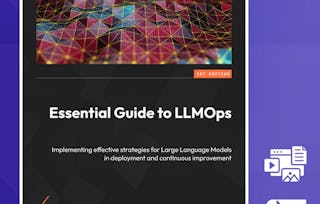Learn the fundamentals of large language models (LLMs) and put them into practice by deploying your own solutions based on open source models. By the end of this course, you will be able to leverage state-of-the-art open source LLMs to create AI applications using a code-first approach.

Open Source LLMOps Solutions

Open Source LLMOps Solutions
This course is part of Large Language Model Operations (LLMOps) Specialization


Instructors: Noah Gift
Access provided by ITC-Infotech
4,056 already enrolled
Gain insight into a topic and learn the fundamentals.
26 reviews
Beginner level
Recommended experience
4 weeks to complete
at 10 hours a week
Flexible schedule
Learn at your own pace
What you'll learn
Run local large language models
Fine-tune LLMs
Use open-source generative AI
Skills you'll gain
Tools you'll learn
Details to know

Shareable certificate
Add to your LinkedIn profile
Assessments
9 assignments
Taught in English
See how employees at top companies are mastering in-demand skills

Build your subject-matter expertise
This course is part of the Large Language Model Operations (LLMOps) Specialization
When you enroll in this course, you'll also be enrolled in this Specialization.
- Learn new concepts from industry experts
- Gain a foundational understanding of a subject or tool
- Develop job-relevant skills with hands-on projects
- Earn a shareable career certificate

There are 4 modules in this course
Earn a career certificate
Add this credential to your LinkedIn profile, resume, or CV. Share it on social media and in your performance review.
Offered by
Why people choose Coursera for their career

Felipe M.
Learner since 2018
"To be able to take courses at my own pace and rhythm has been an amazing experience. I can learn whenever it fits my schedule and mood."

Jennifer J.
Learner since 2020
"I directly applied the concepts and skills I learned from my courses to an exciting new project at work."

Larry W.
Learner since 2021
"When I need courses on topics that my university doesn't offer, Coursera is one of the best places to go."

Chaitanya A.
"Learning isn't just about being better at your job: it's so much more than that. Coursera allows me to learn without limits."
Learner reviews
- 5 stars
76.92%
- 4 stars
23.07%
- 3 stars
0%
- 2 stars
0%
- 1 star
0%
Showing 3 of 26
ND
Reviewed on Aug 21, 2024
Great learning resources that will be useful long after completing the course, concise presentations, and clear explanations of all topics





